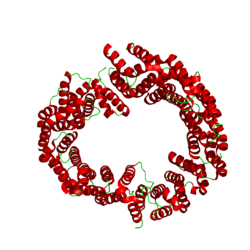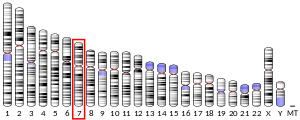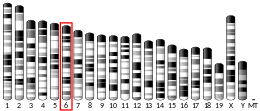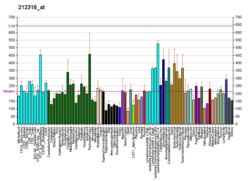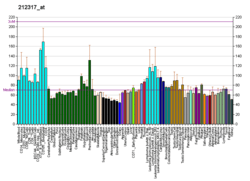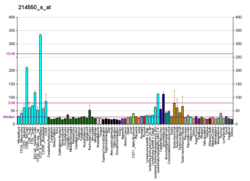Transportin-3
Transportin-3 is a protein that in humans is encoded by the TNPO3 gene.[5][6][7]
Function
TNPO3 is a nuclear import receptor for serine/arginine-rich (SR) proteins, including Serine/arginine-rich splicing factor 1, which are essential precursor-mRNA splicing factors.[5][7]
Clinical significance
The TNPO3-IRF5 locus is implicated in primary biliary cirrhosis and systemic sclerosis.[8]
gollark: Android is really a pretty terrible platform if you go off the "happy path" of Google services everywhere, Play Store apps, shiny recent phones which actually get software updates, and not wanting to tweak anything beyond, well, wallpapers.
gollark: By 2030 phone backs will just be entirely cameras.
gollark: <@151391317740486657> Please explain thyself.
gollark: What's wrong with it?
gollark: Maybe dimensional doors rifts?
References
- GRCh38: Ensembl release 89: ENSG00000064419 - Ensembl, May 2017
- GRCm38: Ensembl release 89: ENSMUSG00000012535 - Ensembl, May 2017
- "Human PubMed Reference:". National Center for Biotechnology Information, U.S. National Library of Medicine.
- "Mouse PubMed Reference:". National Center for Biotechnology Information, U.S. National Library of Medicine.
- Kataoka N, Bachorik JL, Dreyfuss G (Jul 1999). "Transportin-SR, a nuclear import receptor for SR proteins". J Cell Biol. 145 (6): 1145–52. doi:10.1083/jcb.145.6.1145. PMC 2133142. PMID 10366588.
- Lai MC, Lin RI, Huang SY, Tsai CW, Tarn WY (Apr 2000). "A human importin-beta family protein, transportin-SR2, interacts with the phosphorylated RS domain of SR proteins". J Biol Chem. 275 (11): 7950–7. doi:10.1074/jbc.275.11.7950. PMID 10713112.
- "Entrez Gene: TNPO3 transportin 3".
- Radstake TR, Gorlova O, Rueda B, et al. (May 2010). "Genome-wide association study of systemic sclerosis identifies CD247 as a new susceptibility locus". Nat. Genet. 42 (5): 426–9. doi:10.1038/ng.565. PMC 2861917. PMID 20383147.
Further reading
- Maruyama K, Sugano S (1994). "Oligo-capping: a simple method to replace the cap structure of eukaryotic mRNAs with oligoribonucleotides". Gene. 138 (1–2): 171–4. doi:10.1016/0378-1119(94)90802-8. PMID 8125298.
- Suzuki Y, Yoshitomo-Nakagawa K, Maruyama K, et al. (1997). "Construction and characterization of a full length-enriched and a 5'-end-enriched cDNA library". Gene. 200 (1–2): 149–56. doi:10.1016/S0378-1119(97)00411-3. PMID 9373149.
- Lai MC, Lin RI, Tarn WY (2001). "Transportin-SR2 mediates nuclear import of phosphorylated SR proteins". Proc. Natl. Acad. Sci. U.S.A. 98 (18): 10154–9. doi:10.1073/pnas.181354098. PMC 56931. PMID 11517331.
- Allemand E, Dokudovskaya S, Bordonné R, Tazi J (2003). "A conserved Drosophila transportin-serine/arginine-rich (SR) protein permits nuclear import of Drosophila SR protein splicing factors and their antagonist repressor splicing factor 1". Mol. Biol. Cell. 13 (7): 2436–47. doi:10.1091/mbc.E02-02-0102. PMC 117325. PMID 12134081.
- Strausberg RL, Feingold EA, Grouse LH, et al. (2003). "Generation and initial analysis of more than 15,000 full-length human and mouse cDNA sequences". Proc. Natl. Acad. Sci. U.S.A. 99 (26): 16899–903. doi:10.1073/pnas.242603899. PMC 139241. PMID 12477932.
- Scherer SW, Cheung J, MacDonald JR, et al. (2003). "Human chromosome 7: DNA sequence and biology". Science. 300 (5620): 767–72. doi:10.1126/science.1083423. PMC 2882961. PMID 12690205.
- Ota T, Suzuki Y, Nishikawa T, et al. (2004). "Complete sequencing and characterization of 21,243 full-length human cDNAs". Nat. Genet. 36 (1): 40–5. doi:10.1038/ng1285. PMID 14702039.
- Colland F, Jacq X, Trouplin V, et al. (2004). "Functional proteomics mapping of a human signaling pathway". Genome Res. 14 (7): 1324–32. doi:10.1101/gr.2334104. PMC 442148. PMID 15231748.
- Gerhard DS, Wagner L, Feingold EA, et al. (2004). "The status, quality, and expansion of the NIH full-length cDNA project: the Mammalian Gene Collection (MGC)". Genome Res. 14 (10B): 2121–7. doi:10.1101/gr.2596504. PMC 528928. PMID 15489334.
- Tsang HT, Connell JW, Brown SE, et al. (2006). "A systematic analysis of human CHMP protein interactions: additional MIT domain-containing proteins bind to multiple components of the human ESCRT III complex". Genomics. 88 (3): 333–46. doi:10.1016/j.ygeno.2006.04.003. PMID 16730941.
- Ewing RM, Chu P, Elisma F, et al. (2007). "Large-scale mapping of human protein-protein interactions by mass spectrometry". Mol. Syst. Biol. 3 (1): 89. doi:10.1038/msb4100134. PMC 1847948. PMID 17353931.
This article is issued from Wikipedia. The text is licensed under Creative Commons - Attribution - Sharealike. Additional terms may apply for the media files.
